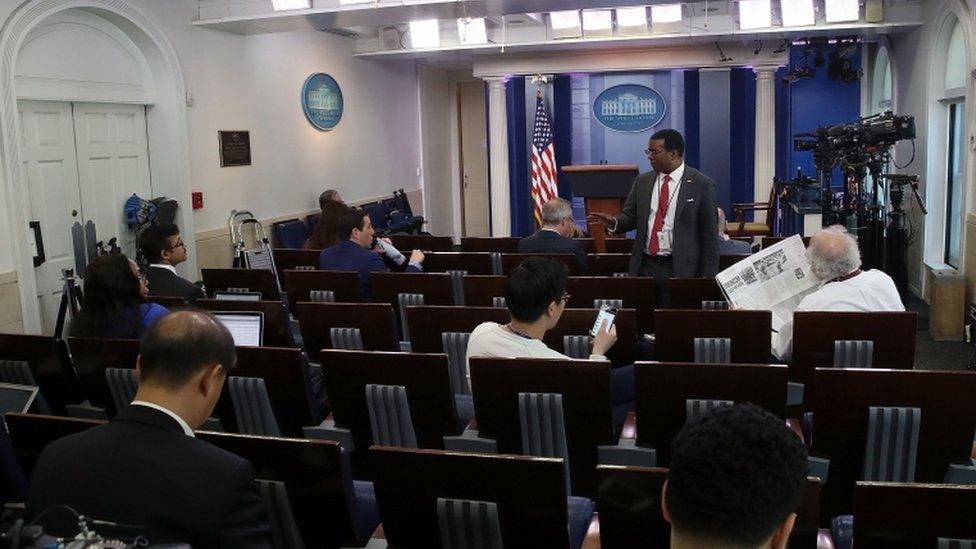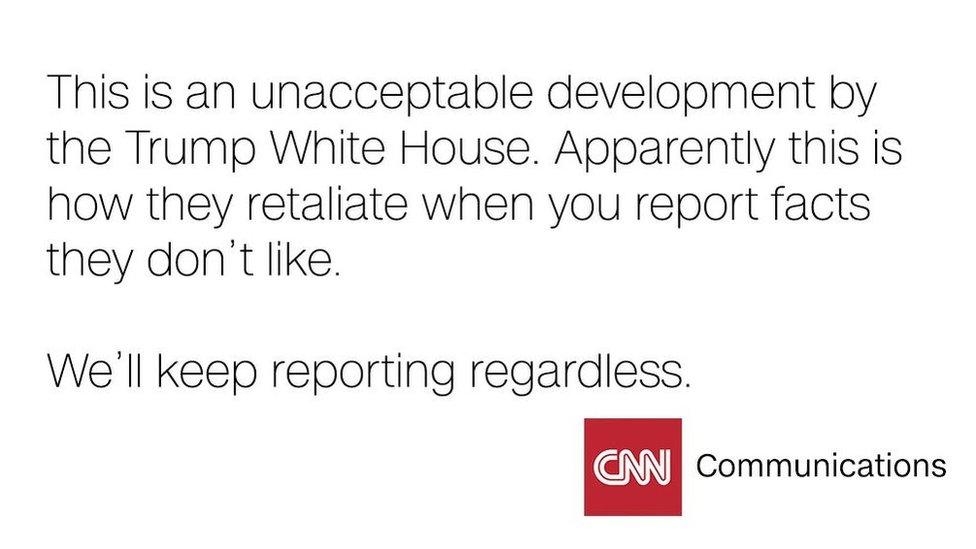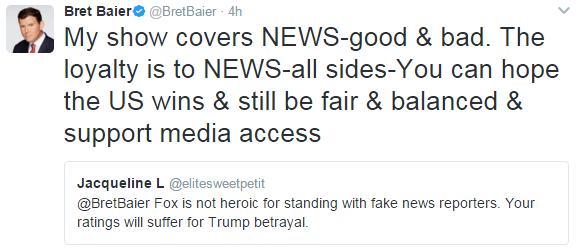White House briefing bar: Media groups condemn exclusion
- Published
Sean Spicer is challenged about selected media being barred from his press briefing
Media groups have reacted angrily after several, including the BBC, were barred from an informal briefing with White House Press Secretary Sean Spicer.
The excluded New York Times said the move was "an unmistakable insult to democratic ideals".
The bar came hours after President Donald Trump delivered another attack on the media, saying that "fake news" was the "enemy of the people".
The BBC has asked the White House to clarify its exclusion.
BBC bureau chief in Washington, Paul Danahar, said: "We understand that there may be occasions when, due to space or circumstances, the White House restricts press events to the established pool. However, what happened today did not fit into that pattern."
He added: "Our reporting will remain fair and impartial, regardless."
Jeff Mason, president of the White House Correspondents Association, tells Today that the media are key to democracy in the US
'Expanded pool'
Friday's briefing had been scheduled as an on-camera event in the briefing room but was changed to an informal off-camera event, known as a "gaggle", in Mr Spicer's office.
Explaining the move to go off-camera, he said: "We don't generally do, we haven't done briefings when the president's had a major event."

Several media groups have said they will not participate in gaggles in future if the exclusions continue
Mr Spicer said an "expanded" pool of journalists had been invited to the gaggle. Pools are not uncommon - the journalists attending then share their reporting with the White House press corps.
However, the choice of those attending, including groups seen as friendly to the Trump administration, and the fact that other journalists who asked to attend were refused entry drew condemnation from media groups.

CNN posted a response on Twitter
White House Correspondents' Association President Jeff Mason said it was "protesting strongly".
The BBC, CNN, the New York Times, the Guardian, the Los Angeles Times, Buzzfeed, the Daily Mail and Politico were among those excluded.
Those allowed into the room included ABC, Fox News, Breitbart News, Reuters and the Washington Times.
The Associated Press, USA Today and Time magazine refused to attend as a protest against the move.
Both the Washington Post and McClatchy said they were unaware of the exclusions at the time and that had they known, their reporters would not have attended the gaggle.
Both said they would not participate in future briefings if the exclusions continued.



The Fox News anchor drew praise - and criticism from Trump supporters - for his tweets on the matter

An anchor for Fox News, seen as supportive of the Trump presidency, also revealed opposition to the move.
Bret Baier tweeted: "We joined w/all networks in a complaint to WH about the incident."
Five things we learned about President Trump from his address to conservative activists.
When asked at the gaggle, Mr Spicer denied CNN and the New York Times had been denied access because the White House was unhappy with their coverage.
But he said: "We are just not going to sit back and let false narratives, false stories, inaccurate facts get out there."
CNN anchor Jake Tapper said the exclusion was "not acceptable, in fact it's petulant. And indicative of a lack of basic understanding of how an adult White House functions".
Where do Donald Trump supporters get their news from?
Washington Post executive editor Marty Baron said the White House move was "appalling".
In an editorial, external, the LA Times said: "If the intent was to intimidate reporters into writing fewer things that the administration does not like, and more things that it does, it is doomed to failure."
The New York Times editorial, external said: "That First Amendment can be inconvenient for anyone longing for power without scrutiny. Mr. Trump might want to brush up on what it means, and get used to it."
Hours before the briefing, Mr Trump had delivered a strong attack on what he called "fake news" in the media, targeting stories with unnamed sources.
He told the Conservative Political Action Conference (CPAC) that reporters "shouldn't be allowed to use sources unless they use somebody's name. Let their name be put out there".
He said "fake news" was the "enemy of the people".
Reports claiming his campaign aides had contact with Russian intelligence officials have particularly irked the president.

More on Trump and Russia
